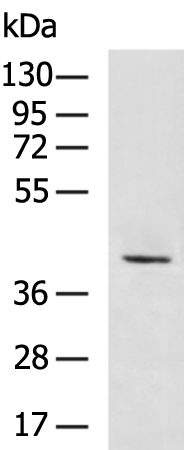
| WB | 咨询技术 | Human,Mouse,Rat |
| IF | 咨询技术 | Human,Mouse,Rat |
| IHC | 咨询技术 | Human,Mouse,Rat |
| ICC | 技术咨询 | Human,Mouse,Rat |
| FCM | 咨询技术 | Human,Mouse,Rat |
| Elisa | 1/5000-1/10000 | Human,Mouse,Rat |
| Aliases | RDC1; CXCR7; RDC-1; CMKOR1; CXC-R7; CXCR-7; GPR159 |
| WB Predicted band size | 41 kDa |
| Host/Isotype | Rabbit IgG |
| Antibody Type | Primary antibody |
| Storage | Store at 4°C short term. Aliquot and store at -20°C long term. Avoid freeze/thaw cycles. |
| Species Reactivity | Human, Mouse, Rat |
| Immunogen | Synthetic peptide of human ACKR3 |
| Formulation | Purified antibody in PBS with 0.05% sodium azide and 50% glycerol. |
+ +
以下是关于ACKR3抗体的3篇文献概览:
---
1. **文献名称**:*ACKR3/CXCR7 signaling axis regulates CXCL12-mediated tumor progression and immune modulation in glioblastoma*
**作者**:Benny Chua et al.
**摘要**:该研究开发了一种针对ACKR3的单克隆抗体,用于阻断其与趋化因子CXCL12的相互作用。实验表明,该抗体通过抑制ACKR3在胶质母细胞瘤中的活性,显著降低肿瘤细胞的迁移和血管生成,并增强免疫细胞浸润,提示其作为潜在治疗靶点。
---
2. **文献名称**:*Atypical chemokine receptor ACKR3 regulates β-arrestin-dependent signaling through CXCL12 activation*
**作者**:Mélanie Héliot et al.
**摘要**:研究者利用特异性ACKR3抗体探究其信号传导机制,发现ACKR3通过β-arrestin途径介导CXCL12的非典型信号,调控细胞存活和增殖。抗体阻断实验揭示了ACKR3在癌症转移中的关键作用,为靶向干预提供了依据。
---
3. **文献名称**:*Development of a neutralizing antibody against ACKR3 for the suppression of breast cancer metastasis*
**作者**:Laura M. Salazar et al.
**摘要**:该研究报道了一种新型中和抗体,可选择性结合ACKR3的胞外域,有效抑制乳腺癌细胞的侵袭和转移。动物模型显示,该抗体通过干扰ACKR3与CXCR4的协同作用,显著减少肺转移灶形成,具有临床转化潜力。
---
以上文献聚焦于ACKR3抗体的开发、机制研究及治疗应用,涵盖肿瘤迁移、信号通路调控等方向。如需具体期刊信息或补充内容,可进一步调整检索策略。
ACKR3 (Atypical Chemokine Receptor 3), also known as CXCR7. is a G protein-coupled receptor (GPCR) that binds chemokines CXCL11 and CXCL12. Unlike classical chemokine receptors, ACKR3 does not activate G protein-mediated signaling but regulates chemokine availability via scavenging or internalization. It plays critical roles in cell migration, immune responses, angiogenesis, and organ development. ACKR3 is highly expressed in various cancers, where it promotes tumor growth, metastasis, and resistance to therapy by modulating CXCL12/CXCR4 signaling and activating β-arrestin pathways. It’s also implicated in cardiovascular diseases, inflammation, and neurological disorders.
ACKR3 antibodies are essential tools for studying its expression, localization, and function. They enable detection in techniques like Western blot, immunohistochemistry, and flow cytometry. Therapeutic antibodies targeting ACKR3 are under exploration to disrupt its interaction with CXCL12. aiming to inhibit cancer progression or inflammatory processes. However, challenges remain in specificity and minimizing off-target effects due to structural similarities with other chemokine receptors. Research continues to clarify its dual roles in physiological and pathological contexts, highlighting its potential as a diagnostic marker or therapeutic target.
×